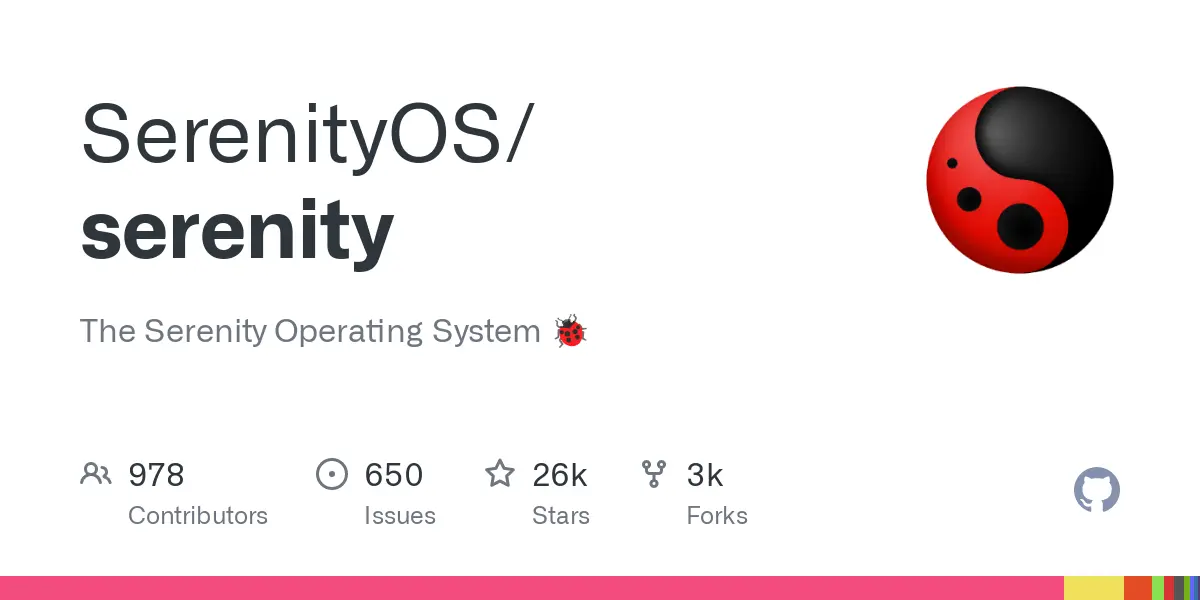GitHub - SerenityOS/serenity: The Serenity Operating System 🐞
GitHub - SerenityOS/serenity: The Serenity Operating System 🐞

The Serenity Operating System 🐞. Contribute to SerenityOS/serenity development by creating an account on GitHub.

GitHub - SerenityOS/serenity: The Serenity Operating System 🐞

The Serenity Operating System 🐞. Contribute to SerenityOS/serenity development by creating an account on GitHub.

You're viewing a single thread.
Why do groups insist on BSD/MIT/Apache style licensing...
I don't know about the creators of this project, but in general: So that they can use the stuff in their closed source applications while finding enough contributors to write software for them for free.
Because I like the 2-clause BSD license. I am not a fan of “copyleft” or forcing obligations on people in general. I want my software to be available for anyone who wants to use it.
He missed the entire point of copyleft which is a bit disappointing.
All well, at least it is libre. I respect his choice in the end as pressuring or forcing someone to use a copy left license us just as bad as proprietary software
The GPL is a better choice if you want to make money from the software. With a pushover license, your competitors can extend the program and profit from it in a way you can't because they aren't required to give the changes back. The GPL evens the playing field. Of course, you often see the original company requiring a CLA so they retain copyright over all of the code.
On the other hand, it does enable possibilities that you would be very unlikely to get otherwise. For example, Cedega (formerly WineX) forked Wine when it used a pushover license and brokered deals with game companies to make the DRM compatible with WineX/Cedega. That meant you could play these games on Linux-based OSes with Cedega, but not Wine. I really wonder if it would have been possible to make Wine compatible with some of these DRM schemes otherwise. Consequently, however, Cedega could not incorporate any changes from LGPL'd Wine, as that would have required them to license Cedega under the LGPL, too.
That's another issue. You can incorporate MIT-licensed software in GPL software, but you can't incorporate GPL software in MIT-licensed software. So going with the GPL gives you more options. As SerenityOS is building everything from scratch, this isn't an issue, but you can well see how it could be. The LGPL is far less disruptive to people who want to release their software under a pushover license. It only requires you give back any changes to the LGPL-licensed part, and does not cover other parts of your program. Personally, I really like the LGPL. It levels the playing field while being quite compatible. It's not perfect either, of course.
It's a tricky question, and there are no right answers. Ultimately, the decision is up to the developer and I can't fault any choice, including the decision to use a proprietary license.
I personally won't use any proprietary software and I especially won't use any DRM. The purpose of the GPL isn't to force companies to pay up to get out of copy left. The purpose is to keep the code free no matter what so that people can control there own computing
That's also my preference, but very few games are free software. And most of the games I want to play are encumbered with DRM or cost ten times as much to get DRM-free. Of course, I buy them DRM-free because the DRM doesn't work with Wine, but if it worked with Cedega...well, I might re-evaluate.
The purpose of the GPL isn’t to force companies to pay up to get out of copy left.
That's why it was created, but in practice, many companies make money by selling exceptions. See Cal.com and CKEditor5, for instance. I didn't mention this at all in my comment, though, so I'm not quite sure which part you're responding to. By "level playing field", I meant that everyone can improve Sourcehut and sell a service with more features, but they need to release those new features under the same license, meaning they will make it back to Sourcehut proper. Selling exceptions isn't the only way to make money from free software.
For some software, where EEE tactics aren't a concern, but corporate adoption matters, these licenses make perfect sense. However. that's not the case here: an OS is a prime target for EEE.